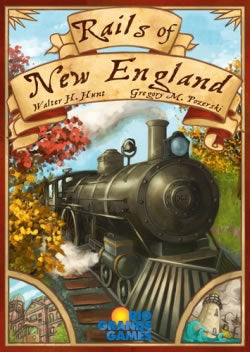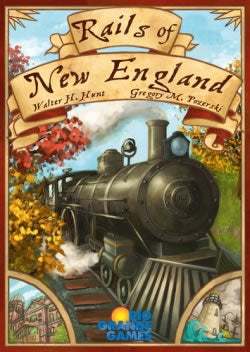RGG433 Rails of New England Rio Grande Games
RGG433 Rails of New England Rio Grande Games
- Available
- Out of stock
- Pre order
Regular price
$113.00 CAD
Regular price
$126.00 CAD
Sale price
$113.00 CAD
Unit price
per
Shipping calculated at checkout.
Couldn't load pickup availability

RGG433 Rails of New England by Rio Grande Games
Players in New England Rails each represent a particular state during the 19th century - Connecticut and New Hampshire with two players, with Vermont added for three players, and so on - and start with two or three businesses in play under their control. Your goal in NER is to have more assets than other players at game end, as determined by cash in hand, cost of businesses owned, special routes completed and state subsidies acquired.
The game lasts at most 16 rounds. Each round players forecast the upcoming economic condition - depression, normal or prosperity - for a future turn, then take care of any events that occur, such as Improved Bridge Building Techniques that allow players to build across estuaries or Sheep Boom Goes Bust which represents the decreased demand for wool from New England farmers as the century progressed. Four of the first five events are fixed and represent historical activities, while the other events - including devastating floods, snow, and an improved business climate - are randomized into a face-down deck. Players then each draft a business or action card, with the option to play it immediately (thereby gaining a free action) if they choose to pay the cost.
If all mail routes, state subsidies and special routes are claimed by the end of any round, the game ends at that point, otherwise the game ends after round 16, with the richest player winning New England Rails. 2-5 Players
Players in New England Rails each represent a particular state during the 19th century - Connecticut and New Hampshire with two players, with Vermont added for three players, and so on - and start with two or three businesses in play under their control. Your goal in NER is to have more assets than other players at game end, as determined by cash in hand, cost of businesses owned, special routes completed and state subsidies acquired.
The game lasts at most 16 rounds. Each round players forecast the upcoming economic condition - depression, normal or prosperity - for a future turn, then take care of any events that occur, such as Improved Bridge Building Techniques that allow players to build across estuaries or Sheep Boom Goes Bust which represents the decreased demand for wool from New England farmers as the century progressed. Four of the first five events are fixed and represent historical activities, while the other events - including devastating floods, snow, and an improved business climate - are randomized into a face-down deck. Players then each draft a business or action card, with the option to play it immediately (thereby gaining a free action) if they choose to pay the cost.
If all mail routes, state subsidies and special routes are claimed by the end of any round, the game ends at that point, otherwise the game ends after round 16, with the richest player winning New England Rails. 2-5 Players

